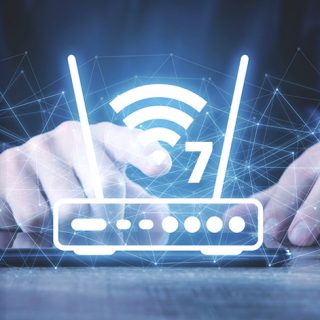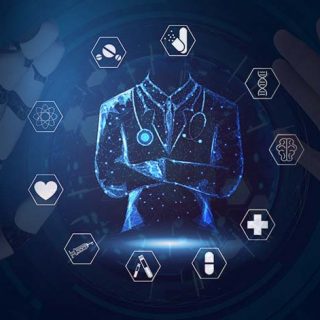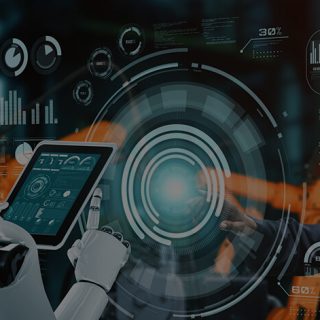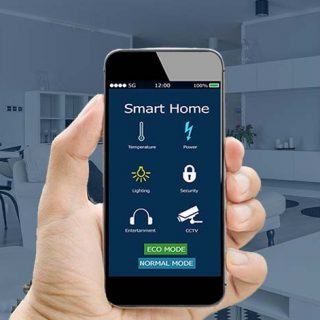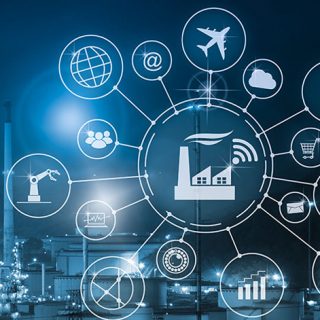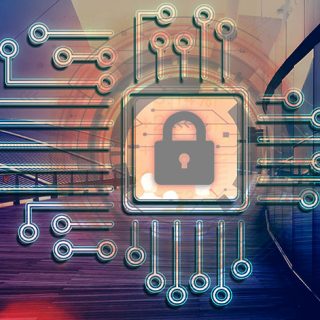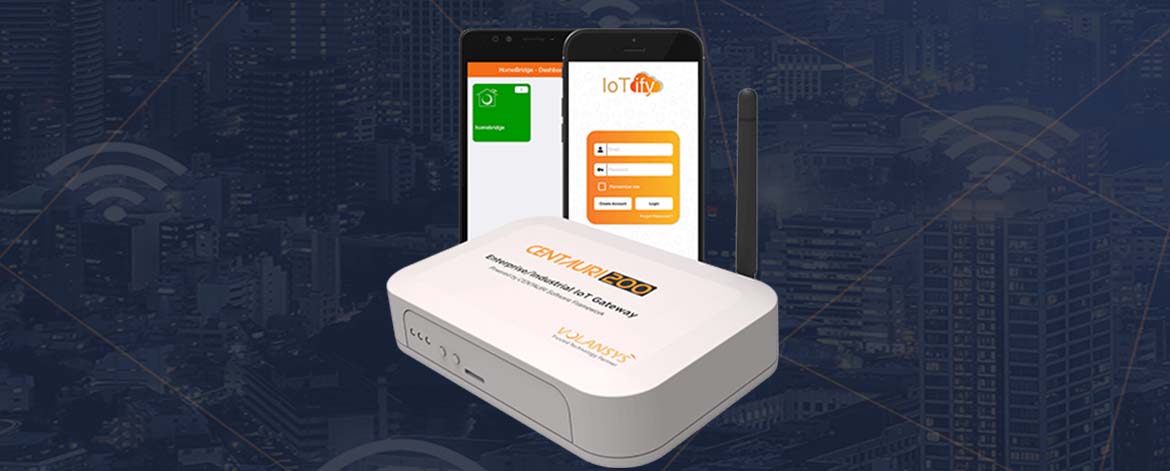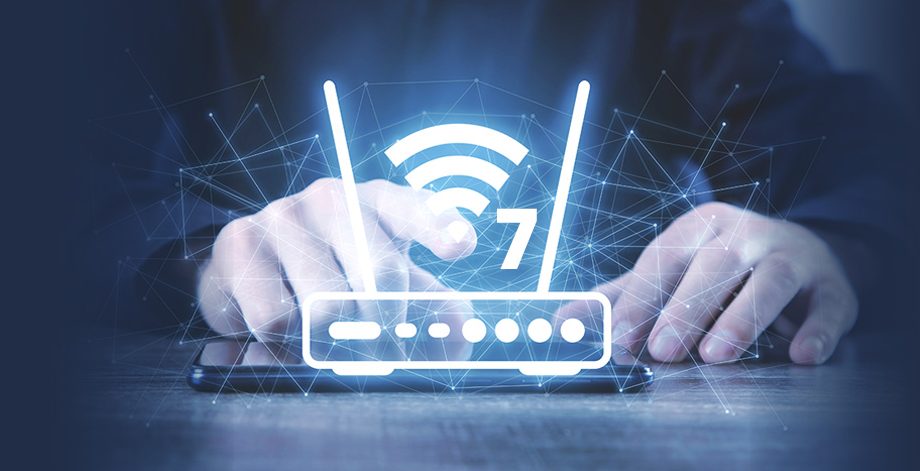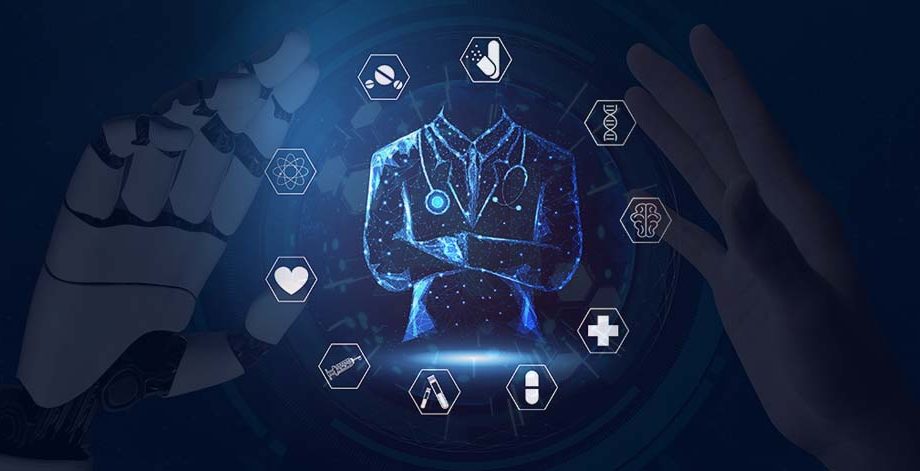The Enterprise and Automotive Internet of Things (IoT) market will grow to 5.8 billion endpoints in 2020 with a 21.5% rise on a year-on-year basis, according to Gartner Inc. Today, businesses deploy a strategy of “start small think big”. IoT is destined to expand rapidly over the coming years, and convergence will unleash a new dimension of connected services that improve the quality of consumers’ life and enterprise productivity.
How enterprises roll out an end-to-end IoT system?
Following are the critical IoT ecosystem components:
IoT Gateway: One of the main components of an IoT ecosystem, a Gateway enables easy management of data traffic flow between the IoT devices and connected networks. The importance of IoT gateways is understandable when the use case of an IoT-connected environment is considered. An IoT gateway aggregates sensor data translates between sensor protocols and processes sensor data before sending it onward.
IoT Network: Manufacturers and operators of smart commercial and industrial environments deploying massive mesh networks need to be able to commission, control and monitor the number of end nodes. The network security, flexibility, interoperability, scaling, and robustness are critical to Large Nodes Network (LNN) commercial success.
IoT Connectivity: When it comes to IoT connectivity, the IoT device/sensor collects information and shares it with the next layer with the help of different wireless communication protocols such as Bluetooth, ZigBee, Z-wave, Thread and other proprietary RF protocols for IoT Gateway connectivity and Wi-Fi, Ethernet, Cellular for north-bound connectivity.
IoT Devices: With IoT end devices expanding enormously, there will be a vast number of sensors with diverse functionalities like measuring temperature, light, noise, the position of people and equipment, security systems and more. More often than not, these IoT devices are very low powered, battery-operated, end devices attached with one or multiple sensors. At the same time, they need to be part of LNN and responding quickly to any changes in the sensor readings or any control required from the user or analytics running on the cloud.
Cloud and Mobility: IoT is not just about sensing, it’s also about controlling systems. All data go to the cloud and run IoT services using secure protocols and communication broker service, database service, rules engine, and data analytics services on top of the data visualization platform. Mobile applications enable end-users to control the end devices e.g. turning lights on and off, HVAC, network dashboard/status monitoring, etc.
In summary, choosing the right IoT platform to build, and constant support by an expert group of hardware and cloud technology partners is crucial in successfully embracing the IoT wave. Starting from a large number of end devices with sensors connected wirelessly to IoT gateways, sequentially, connected to cellular or Wi-Fi networks, cloud platforms (PaaS), and mobile applications of end-users. The whole ecosystem needs to work efficiently, securely and with the scale to support large LNNs.

Connected devices come with their own set of challenges and making it a real, affordable and scalable solution for many legacy products. Below are some of the key challenges of IoT:
- Recognizing IoT connectivity options:IoT device connects over different wireless communication protocols such as Bluetooth, ZigBee, Zwave, Thread, LoRA, Sigfox and other proprietary RF protocols for IoT Gateway connectivity and Wi-Fi, Ethernet, Cellular for north-bound connectivity. Each of them may connect to different control environments and have different models for management and security. Due to such diverse RF network intercommunication choices and options available, choosing the right platform for the solution is one of the major challenges.
- Lower ownership cost and achieving faster time to market: Product manufacturers and operators would want to make sure that their IoT strategy will work for the market they serve, and will it be available as a cost-optimized solution and will that be the right fit for the features they want to promote. At the same time, they also want to hit the market as early as possible. The biggest concern for them is choosing the right platform, technology, sensors and how the complete end-to-end solution will look like including the cloud selection, hosted PaaS or SaaS solution, mobile application, etc.
- End to end technical and ownership support: Manufacturers and providers need to have complete support and control over the product from the suppliers’ end in case they want to enhance it further or diversify into another market. Thus, they own up the design and support model such that they get prompt and effective support whenever they require.
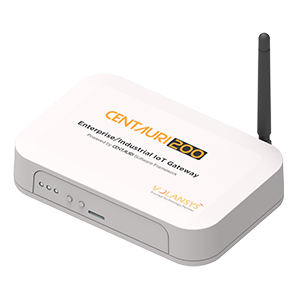
How CENTAURI 200 IoT Gateway Platform is helping OEMs to overcome the challenges?
Centauri200 IoT Gateway is built on power-efficient and cost-optimized ARM® Cortex®-A7 based i.MX6UL/6ULL/6ULZ SoC processor and supports modular RF connectivity to build a multiprotocol IoT Gateway. It can also control/monitor more than 200+ devices through Android and iOS mobile applications and is fully integrated with cloud platforms such as IoTify, AWS IoT, Ayla Networks, IBM BlueMix*, Microsoft Azure*. It will also support AWS IoT Greengrass and AWS IoT Core for quick development on Gateway while providing all standard security and scalability features offered by AWS for IoT Solutions.
VOLANSYS CENTAURI 200 supports multi-radio connectivity for seamless data flow between a variety of cloud options and devices connected over Bluetooth Low Energy (BLE), Thread, Z-Wave, Zigbee module. It also supports LTE Module Quectel EG91/BG95/BG96, Ethernet and Wi-Fi options for northbound connectivity. The Gateway is now certified by Verizon for CAT M1 and CAT1 category, enabling solution providers to focus more on their end user-application. This range of capability encourages OEMs and IoT solution providers to build their solutions using the CENTAURI 200 IoT Gateway.
The Gateway reference design includes quick customization and application deployment including production-ready hardware, schematics, bill of materials and fully documented software. Designers can evaluate, develop, prototype, iterate, field test, install and maintain LNNs for commercial settings. It also extends an opportunity for solution providers to build their business applications quickly by using CENTAURI Software Framework on the CENTAURI Gateway platform.
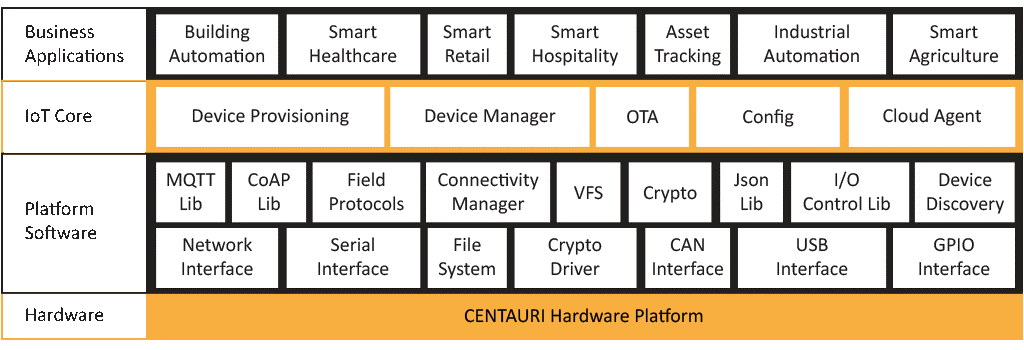
The CENTAURI 200 gateway provides an edge to several IoT solution providers and OEMs to build a feature-rich business application based on open-source Linux platform and offer secure communication, relevant business logic, real-time alerts and more. This is a major differentiator as compared to other IoT gateways available in the market today. On top of it, the modular architecture allows this platform more edge and versatility compared to other Gateway solutions.
What’s the cost of ownership and time to market for Gateways built on CENTAURI 200 Platform?
Let’s take an example. One of the leading commercial lighting solution providers, looking to enable their IoT strategy to scale up, build new features and new connected lighting solutions for smart cities, chooses to use CENTAURI 200 IoT gateway platform, first for proof of concept and then for making a custom design.
Proof of concept in 2 weeks: VOLANSYS helps this customer to first understand the concept and their connected strategy and further helps them with building a proof of concept for the same using Thread-enabled end devices integrated to their lighting fixtures and build end to end demo using CENTAURI 200 Gateway solution all within the span of around 2 weeks. The customer is able to use this for field trials and early demos of this product concept.
Custom design changes & production in 12 weeks, simultaneous certification in 6 weeks: After successfully completing the proof of concept phase, the customer wants to go for a custom-built version of gateway solution to remove additional peripherals. VOLANSYS engages with the customer to trim down and produce/manufacture the custom solution in around 12 weeks and helps with a formal certification of the product in another 6-8 weeks. Certification activity can go in parallel if there are no major design changes impacting the pre-certification.
The cost of ownership 60-70K USD, landed cost below USD 50K: The customer spends around USD 60-70K including modification in the design, re-branding, custom packaging NRE and certification cost and ready to launch the custom Gateway solution within the production timeline, the cost of the custom Gateway landed around USD sub-60s at a volume of 10,000 units.
If the customer were to design and develop this custom solution on their own, without leveraging the CENTAURI 200 Gateway platform, it would have easily cost them at least USD 250K of design, development, NRE & certification cost and taken 1.5+ years to get to a point where the product was ready for launch. Hence the CENTAURI 200 Gateway platform allowed them to reduce time to market and the design, development cost by a factor of 3, which is substantial.
| Option | Proof of Concept | Design, Development & Production | Certification | Cost of Ownership | Ready to launch | Landed Cost per unit approx. (USD) |
| Using VOLANSYS CENTAURI 200 Gateway Platform | 2 Weeks | 12 Weeks | Parallel activity to production (6 weeks as a platform is pre-compliant) | 60K USD (custom changes, rebranding, customize packaging) | USD 60 | Within 24 Weeks |
| Custom Gateway Design | Minimum 12 Weeks | Minimum 30 Weeks | 8-10 Weeks with pre-compliance | 250k USD | USD 70 | Minimum 60+ Weeks |
For more details on VOLANSYS’ CENTAURI 200 IoT Gateway reference design platform, please visit CENTAURI 200 IoT Gateway
VOLANSYS offers a powerful IoT Gateway solution with a variety of wired and wireless connectivity options to address the needs of Enterprise as well as Industrial IoT Solutions. Our solution provides flexibility to design and develop solutions in the areas of Smart Healthcare, Smart Building Automation, Smart Home Automation, Smart Asset Tracking, Smart Industrial Automation, Smart Retail, and Smart Hospitality.
For more information on CENTAURI 200 IoT Gateway, please Contact us.

About the Author: Kalpesh Balar
Kalpesh works with VOLANSYS Technologies as Project Manager and looks after product development and end to end solutioning. Kalpesh has a rich experience of around 14+ years in various domain product development that brings greater value to our clients to implement their one-stop solution.
